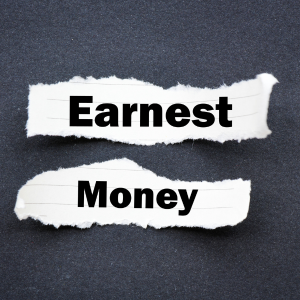
Understanding The Importance Of Earnest Money In Texas Real Estate Transactions
Earnest money is crucial in Texas real estate transactions. The buyer pays a deposit to demonstrate their seriousness and commitment to purchasing the property.
This money protects the seller if the buyer cancels the transaction without a valid reason. In Texas, earnest money is typically 1% to 2% of the total purchase price, but this can vary depending on the agreement between the parties.
Understanding earnest money regulations is crucial for buyers and sellers to ensure a smooth transaction. It is important to note that earnest money is not the same as a down payment and will be applied to the down payment or closing costs when the transaction closes.
In some cases, if all conditions are met, the buyer’s earnest money may be returned. In the event of a breach of contract, the seller may forfeit earnest money to compensate for damages.
Both parties must clearly understand and follow the rules during a real estate transaction in Texas to avoid disputes and complications.
Recent Changes To Earnest Money Laws In Texas: What Buyers And Sellers Need To Know

The rules and regulations governing earnest money in Texas real estate transactions have recently changed. These changes have important implications for buyers and sellers in these transactions.
All parties involved must understand the new laws to ensure a successful transaction. Buyers must know their rights and responsibilities, and sellers must understand their obligations when accepting or rejecting earnest money offers.
With these recent changes, buyers and sellers must stay informed and current on the rules governing earnest money in Texas real estate transactions.
The Role Of Earnest Money In Protecting Both Buyers And Sellers In A Real Estate Deal
Earnest money protects the interests of buyers and sellers in Texas real estate transactions. This initial deposit, typically made by the buyer, is proof of good faith and commitment to the transaction.
Earnest money offers financial security to the seller in case the buyer withdraws without a valid reason. It also protects both parties against potential losses or damages caused by the other party’s actions.
Earnest money also incentivizes both parties to meet their obligations, ensuring that the transaction runs smoothly. Understanding earnest money regulations is crucial for all parties involved in Texas real estate transactions.
Exploring The Legalities Of Who Gets Earnest Money When A Buyer Backs Out In Texas

Earnest money is a crucial part of Texas real estate transactions, serving as a good faith deposit from the buyer to show their commitment to purchasing the property. However, there are times when the buyer may back out of the deal, raising concerns about who gets to keep the earnest money.
Texas law allows buyers to receive their earnest money back if they back out due to valid reasons like a failed inspection or inability to secure financing. However, if the buyer withdraws without a valid reason, the seller may be able to retain the earnest money as compensation for lost time and potential buyers.
Both parties must fully understand and follow these rules to avoid legal disputes or complications.
Top Factors That Influence Whether A Buyer Can Get Their Earnest Money Back In Texas
It’s important to know the rules about earnest money when buying a house in Texas. The buyer usually puts down a large deposit to show that they are serious about buying the house. This deposit can be very important and determine whether the deal goes through.
Several things might affect a buyer’s ability to get their earnest money back if the deal falls through. One important factor is the contingencies written into the contract, like inspection or financing contingencies.
If these things don’t happen, the buyer might be able to get their earnest money back. Another thing to think about is if either party breaks the contract. If that happens, one party could lose the right to the earnest money.
To determine if a buyer can get their earnest money back, it is also important to follow the steps to end a contract and provide proof. Knowing these things and working closely with a real estate agent or lawyer can help Texas buyers keep their earnest money safe during the transaction process.
The Process Of Disputing Earnest Money In Texas: Tips For Buyers And Sellers

In Texas, earnest money is crucial in real estate transactions. The buyer uses it as a good faith deposit to show their commitment to buying the property.
However, earnest money releases may cause disputes. Buyers and sellers in this situation must understand Texas earnest money disputes.
First, read the contract and gather evidence to support your claim. Both parties should attempt to resolve the issue through negotiation before taking legal action.
If negotiations fail, parties can sue or seek mediation through the Texas Real Estate Commission. Hiring an experienced attorney can help you navigate this complicated process and protect your rights.
Navigating The Fine Print: Conditions For Keeping Or Returning Earnest Money In Texas
Sifting Through the Details: Texas Requirements for Retaining or Returning Earnest FundsEveryone participating in a Texas real estate transaction needs to be aware of the regulations about earnest money. Buyers place a down payment as a sign of their commitment to buying a property, referred to as earnest money or a good faith deposit.
However, these funds must fulfill a few requirements to be retained by the seller or given back to the buyer. These terms cover things like the parties’ ability to dispute any disagreements, the timeline for contract termination, and the satisfactory completion of repairs and inspections.
To prevent any potential disputes or miscommunications regarding earnest money, it is crucial that both buyers and sellers thoroughly read over and comprehend these terms before beginning a real estate transaction.
Common Scenarios Where A Buyer May Be Entitled To Keep Their Earnest Money In Texas

Earnest money is a crucial aspect of real estate transactions in Texas that both buyers and sellers must understand. It is a deposit paid by the buyer to demonstrate their commitment and seriousness about purchasing the property.
In some cases, buyers can keep their earnest money. These include situations where the seller breaches the contract, title defects are discovered, or financing issues arise.
Additionally, if the buyer decides to back out of the deal for reasons outlined in the contract, they may be able to keep their earnest money. These scenarios can help buyers protect their investments and navigate potential conflicts over earnest money in Texas real estate transactions.
How To Avoid Losing Your Earnest Money Deposit As A Buyer Or Seller In Texas
Understanding earnest money deposits’ rules and regulations is critical for buyers and sellers involved in Texas real estate transactions.
As a buyer, you can protect your earnest money deposit by carefully reading and understanding the contract’s terms before signing, conducting thorough inspections and due diligence on the property, and ensuring that all necessary paperwork and deadlines are followed.
Similarly, as a seller, you can avoid losing the earnest money deposit by being upfront about any potential issues with the property, responding quickly to buyer inquiries and requests, and following all contractual obligations.
Following these tips can help buyers and sellers ensure a smooth transaction without putting their earnest money deposit at risk.
Steps For Properly Documenting And Handling Earnest Money Transactions In Texas

Earnest money rules in Texas can be complex and must be strictly followed to ensure a smooth legal process. A series of steps must be taken to document and handle earnest money transactions properly.
First and foremost, both parties must thoroughly understand the contract’s terms and conditions. This includes the amount of earnest money, the deadline for depositing it, and any circumstances that could affect its return.
Next, a neutral third party, such as a title company or attorney, should deposit the earnest money in an escrow account. This transaction requires proper documentation, such as a receipt or wire transfer confirmation.
To avoid misunderstandings or disputes, all parties involved in the transaction should maintain open and transparent communication throughout. Finally, once all conditions are met, the earnest money should be released following the contract’s terms.
By taking these steps, buyers and sellers can ensure that their earnest money is handled correctly under Texas real estate laws.
Negotiating Earnest Money Amounts: Finding A Balance Between Buyers And Sellers
Buyers and sellers in Texas real estate transactions must negotiate the earnest money carefully because it is a critical component. Buyers usually put down this down payment to assure that they will buy the property, but sellers use it as insurance if the sale falls through.
Still, settling on an appropriate amount of earnest money is not always easy. Sellers may be looking to protect their interests with a higher asking price, but buyers may be wary of taking on too much risk before finalizing the deal.
Knowing the ins and outs of earnest money in Texas and agreeing on an amount that both sides are comfortable with is crucial for a smooth transaction and a fair reflection of the property’s value.
Understanding The Different Types Of Escrow Accounts Used For Holding Earnest Money In Texas

Earnest money is an important aspect of Texas real estate transactions that buyers and sellers must understand. Earnest money is a deposit paid by the buyer to demonstrate their genuine interest in purchasing the property.
To protect this deposit, it is held in an escrow account until the transaction is completed. In Texas, various types of escrow accounts hold earnest money, each with its own set of rules and regulations.
The most common type is a traditional escrow account, in which a neutral third party holds funds until all sale terms are met. Another type is an attorney escrow account, in which an attorney serves as the fund’s custodian and ensures proper disbursement.
Finally, there is a title company escrow account, in which the title company holds the funds while providing title insurance on the sold property. Understanding the various types of escrow accounts can help you have a smooth and successful real estate transaction in Texas.
Tips For Buyers On Maximizing Your Chances Of Getting Your Earnest Money Back If You Back Out
Earnest money is a crucial part of the real estate transaction when purchasing a home in Texas. The buyer makes a deposit to demonstrate their seriousness about buying the property.
In any case, the buyer risks seeing their earnest money eroded if they withdraw from the transaction. Buyers should remember a few things to avoid this.
The first and foremost requirement is familiarity with the Texas statutes and ordinances governing earnest money. You should be aware of the exact dates for depositing and withdrawing earnest money and any conditions that might permit its return.
Another way to safeguard the buyer’s earnest money is to thoroughly negotiate and review the contract terms. Finally, to avoid losing earnest money due to misunderstandings or disputes, it is important to communicate effectively with all parties participating in the deal.
If a buyer decides to back out of a real estate deal in Texas, following these tips can improve their chances of getting their earnest money back.
Crucial Considerations For Sellers When Accepting Or Rejecting An Offer With An Earnest Money Deposit

When selling a house in Texas, sellers need to know the rules about earnest money. This deposit, which the buyer gives as a sign of good faith, can have a big effect on the real estate deal’s outcome.
When deciding whether to accept or reject an offer with an earnest money deposit, the seller should keep a few important things in mind. First, it’s important to read the contract’s terms and conditions carefully to ensure they match your expectations.
Sellers should also consider how much earnest money is being offered and whether it shows how serious the buyer is about making the deal. It’s important to keep in mind that accepting an offer with more earnest money could help in the negotiations.
But sellers should also know that turning down an offer just because of the amount of earnest money might not be the best decision. Other things, like financing and contingencies, should also be considered.
The Impact Of Market Conditions On How Much Buyers Should Offer As An Earnest Money Deposit
Buyers and sellers must understand earnest money rules in Texas’ competitive real estate market. Buyers deposit earnest money to show their seriousness in buying the property.
Earnest money can vary with market conditions. A higher earnest money offer may give the buyer an edge in a seller’s market, where there are more buyers than properties.
In contrast, a buyer’s market with more properties than buyers may allow a lower earnest money offer due to less competition. Buyers should consider market conditions when determining how much earnest money to offer to stand out and increase the likelihood of the seller accepting their offer.
Red Flags To Watch Out For When It Comes To Handling Or Refunding Earnest Money Deposits In Texas

Buyers and sellers should be aware of a few red flags when handling or refunding earnest money deposits in Texas real estate transactions. One major red flag is when the seller requests a large sum of earnest money upfront for no apparent reason.
This could indicate that the seller is attempting to secure a higher offer or isn’t serious about selling the property. Another red flag is when the seller fails to provide specific instructions on handling the earnest money deposit, such as where to deposit it and who will hold the funds.
Buyers should also exercise caution if the seller requests non-refundable earnest money, as this violates Texas real estate laws. To avoid potential issues or misunderstandings during a transaction, both parties must fully understand and follow earnest money deposit rules.
How Working With A Reputable Real Estate Agent Can Help Protect Your Interests Regarding Earnest Money
The regulations governing the use of earnest money in real estate transactions in Texas are complex, so it’s best to consult a trustworthy real estate agent for assistance. They can safeguard your interests concerning earnest money and lead you through the process so you don’t fall into any traps.
It is important to work with an agent who is well-versed in the ins and outs of earnest money in Texas to safeguard your investments and rights. Further, they can act as your representative during negotiations to secure earnest money terms that benefit you.
Finding a trustworthy real estate agent can alleviate your anxiety about the transaction by ensuring that they look out for your best interests.
Do You Lose Your Earnest Money If You Back Out?
Understanding the rules and regulations governing earnest money is essential when it comes to Texas real estate transactions. Earnest money serves as a good faith deposit from the buyer to the seller, demonstrating the buyer’s commitment to purchasing the property.
Many buyers, however, may be concerned about what happens to their earnest money if they cancel the transaction. According to Texas law, a buyer may withdraw from a transaction without forfeiting their earnest money if they cannot secure financing or discover major issues with the property during inspections.
However, if a buyer withdraws for reasons not stated in the contract, they risk losing their earnest money. Before entering a real estate transaction, buyers and sellers must carefully review and understand the contract terms to avoid misunderstandings or potential loss of earnest money.
What Happens To Earnest Money If Buyer Cancels?

Earnest money is important in completing a real estate transaction in Texas. It serves as a good faith deposit from the buyer, demonstrating their intent to purchase the property.
However, there may be instances when the buyer cancels the agreement. In such cases, both parties become concerned about the fate of the earnest money.
According to Texas state law, if a buyer cancels the contract for any valid reason stated in the agreement, they are entitled to their earnest money refund. However, if the buyer violates any of the contract’s terms or fails to meet their obligations, they may forfeit their earnest money deposit.
Buyers and sellers should fully understand the rules and regulations governing earnest money in Texas real estate transactions to avoid potential conflicts or losses.
Can A Buyer Back Out Before Closing In Texas?
Earnest money in Texas provides security for both the buyer and seller in a real estate transaction. When making an offer, the buyer typically provides a percentage of the purchase price.
This shows the seller that the buyer is serious about buying the property. However, there may be times when a buyer wishes to back out before closing.
In such cases, it is critical to understand the laws regarding earnest money in Texas. According to state law, if a buyer cancels without a valid reason, they risk losing their earnest money deposit.
On the other hand, if the seller fails to fulfill the contract’s obligations, the buyer may be entitled to a refund of their earnest money. To avoid potential conflicts or loss of earnest money, both parties must carefully review and understand all terms and conditions before signing a contract.
What Happens If A Buyer Backs Out Of A Purchase Agreement?
Earnest money is an important aspect of real estate transactions in Texas. It serves as the buyer’s good faith deposit, demonstrating their commitment to purchasing the property.
A buyer may, however, withdraw from the purchase agreement in certain circumstances. This can happen for various reasons, including financing falling through or discovering unexpected issues with the property.
In these cases, the seller can keep the earnest money as compensation for removing their property from the market and potentially losing other interested buyers. However, if the buyer has a valid reason for withdrawing, they may be able to recoup their earnest money through negotiations or legal action.
To avoid disputes or misunderstandings, both parties must thoroughly understand the rules and regulations governing earnest money in Texas real estate transactions.
This information applies to Texas and its cities, including Coppell, Sherman, and Red Oak. For assistance or questions, please call us at (214) 225-3042. You can also visit our website at Southern Hills Home Buyers for more details.
Get Cash For Your Texas House Today
We buy houses in Texas without the hassle and red tape. Get your no-obligation cash offer for your home and just be done. Selling in as-is condition has never been easier.


